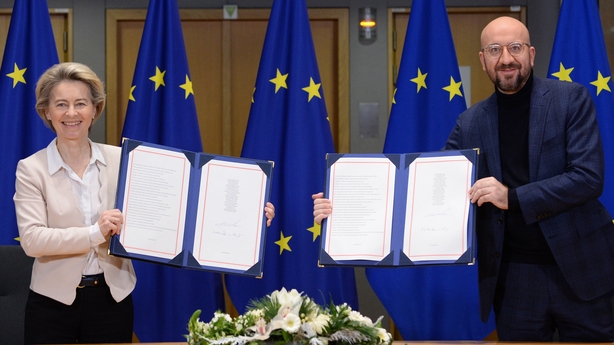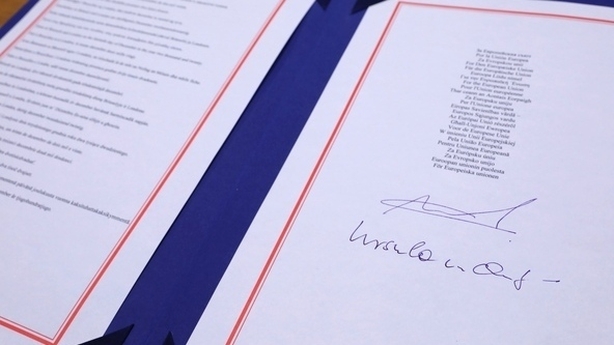British Prime Minister Boris Johnson's has signed a post-Brexit trade deal with the European Union after it cleared the House of Commons, as the Government seeks to rush approval through Parliament in a single day.
After little over four hours' debate, MPs voted by 521 to 73 to give the European Union (Future Relationship) Bill, ratifying the deal finally agreed on Christmas Eve, a third reading.
The Bill now goes to the House of Lords, where the debate is expected to continue until around 10.30pm on Wednesday.
If, as expected, it passes the upper chamber, it will then go to the Queen for royal assent, with an announcement expected around midnight.
That would pave the way for the deal to take effect at 11pm on Thursday when the current Brexit transition period, during which the UK has continued to follow EU rules, ends.
Opening the debate in the Commons, Prime Minister Johnson said the deal would enable the UK to trade and co-operate with the EU on the "closest possible terms" while taking "sovereign control of our laws and our national destiny".
He said he hoped it would end the "old, desiccated, tired, super-masticated arguments" which have dogged the country for years and enable it to move forwards to a "new and great future".
"It embodies our vision shared with our European neighbours of a new relationship between Britain and the EU as sovereign equals joined by friendship, commerce, history interests and values while respecting one another's freedom of action," he said.
"We are going to open a new chapter in our national story, striking free trade deals around the world and reasserting global Britain as a liberal, outward-looking force for good."
We need your consent to load this rte-player contentWe use rte-player to manage extra content that can set cookies on your device and collect data about your activity. Please review their details and accept them to load the content.Manage Preferences
Labour backed the deal, despite misgivings from some pro-European MPs who said they would be abstaining or voting against.
However, party leader Keir Starmer said that while the agreement is "thin" with "many flaws", the alternative is to leave the EU single market and customs union with no agreement, pushing up prices and driving businesses to the wall.
"There's only one choice today, which is to vote for implementing this deal or to vote for no-deal. Those that vote 'no' are voting for no-deal," he said.
"This is the nub of it: those voting 'no' today want 'yes'. They want others to save them from their own vote.
"Voting 'no', wanting 'yes', that's the truth of the situation and that's why my party has taken a different path."
However, the SNP's Westminster leader, Ian Blackford, condemned the deal as "an act of economic vandalism" and attacked Labour for failing to oppose it.
"I am sad to say that the official opposition has been missing in action. I can understand that this might be politically pragmatic for Labour but it definitely isn't politically principled," he said.
'Phenomenal, unique business opportunity' for Northern Ireland
The UK Secretary of state for Northern Ireland has said the post-Brexit trade puts Northern Ireland in a "phenomenal, unique business opportunity", in having the ability to trade across the UK and the EU.
Speaking on RTÉ's News At One, Brandon Lewis said he does not believe that the deal creates a border down the Irish Sea, adding that the deal and the Protocol means the North remains an "integral part" of the UK customs territory.
He said he was not embarrassed to be voting in favour of the deal when the entire political representation of Northern Ireland that sits in Westminster is voting against it, adding that the choice today for MPs was whether they were voting for no-deal or for a trade deal.
Meanwhile, the First Minister of Scotland has called for the Scottish Parliament to vote on principle against a "rotten Brexit that Scotland has rejected all along".
Opening a debate in Holyrood on the Brexit deal, Nicola Sturgeon said the trade deal "has no benefits, only massive downsides".
She said: "This Bill will pass regardless of how Scotland's MPs vote because that's what the Westminster establishment has decided.
"The fact is, Scotland's voice has been ignored on Brexit all along, every single step of the way.
"But the real disgrace of the Tory position is the notion that lies at the heart of it - that the best Scotland can ever hope for is a choice between a terrible outcome and an even worse outcome."
Earlier EU leaders signed the deal with Britain and dispatched it to London, setting their seal on a drawn-out divorce just hours before the UK brings its half-century European experiment to an end.

EU chiefs Ursula von der Leyen and Charles Michel, the heads of the European Commission and European Council, smiled at a brief televised ceremony to put their names to the 1,246-page Trade and Co-operation Agreement.
"It has been a long road. It's time now to put Brexit behind us. Our future is made in Europe," Ms von der Leyen said.
Today, @eucopresident and I signed the EU-UK Trade and Cooperation Agreement.
— Ursula von der Leyen (@vonderleyen) December 30, 2020
Prime Minister @BorisJohnson will sign it later today in London.
It has been a long road. It's time now to put Brexit behind us.
Our future is made in Europe. pic.twitter.com/fjybWryJNY
In Brussels, Mr Michel agreed, saying: "On major issues, the European Union stands ready to work shoulder to shoulder with the United Kingdom.
"This will be the case on climate change, ahead of the COP 26 in Glasgow, and on the global response to pandemics, in particular with a possible treaty on pandemics."

Mr Johnson's government only published the accompanying UK legislation yesterday afternoon - less than 24 hours before the debate was to start in parliament an hour after the signing in Brussels.
The agreement averted the prospect of a cliff-edge separation which would have seen quotas and tariffs slapped on all cross-Channel trade, exacerbating strains in the middle of the coronavirus pandemic, which has hit the UK harder than most.
The agreement will be provisionally applied until the European Parliament ratifies it, which is not expected for at least two months, and MEPs have formally requested even more time to scrutinise the deal.
Additional reporting Sean Whelan

